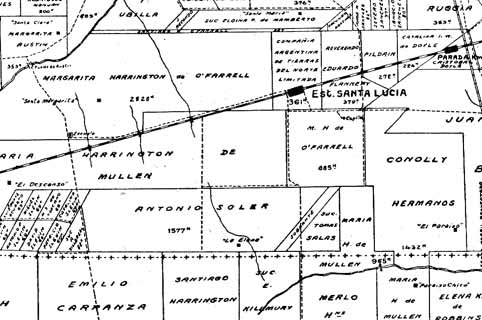|
To celebrate St. Patrick's Day in San Pedro, the local
Irish-Argentine Centre organised an exhibition of old photographs (Fotografías
de viejas familias irlandesas), including images of Irish
settlers and their families in the region. On 25-27 March 2005
hundreds of visitors went to appreciate the eighty-odd collection of
photographs in the municipal rooms of Centro de Comercio e Industria
at San Pedro. A new series of photographs has been added in March
2006.
|
|
Por
estas callejuelas
ancestros invisibles
caminan con nosotros.
Homero Aridjis
(Mexico, 1975)
|
San Pedro is a town
and department in Buenos Aires province, 180 kilometres north of Buenos Aires, on the
bank of the River Paraná. In the nineteenth century San Pedro was among
the ten most important Irish settlements in Argentina, with immigrants
from counties Westmeath, Offaly, Wexford and Clare. The Handbook of the River
Plate of 1892 describes San Pedro in the line of the Buenos Ayres and
Rosario Railway Co. 'Population 6,000, dates
back to the year 1770; it is a thriving port of the Paraná, and has a
resident Irish priest. Two wayside stations are passed, Castro and
Paraiso, in a good sheepfarming district; then two others, Ramallo and
Sanchez, the lands here being some of the best in the province' (Mulhall,
M.G. and E.T., Handbook of the River Plate, comprising the
Argentine Republic, Uruguay and Paraguay' Sixth edition, Buenos
Aires, 1892, pp. 78-79).
By the end of the
nineteenth century, some of the families present in San Pedro were
Austin, Bannon, Barry, Brennan, Cardiff, Carmody, Carthy, Casey, Cleary,
Connell, Cormick, Crowley, Cummins, Dalton, Delaney, Devereux, Dillon,
Dinnegan, Doran, Doyle, Duffy, Duggan, Gill, Harrington, Hoare, Howlin,
McCormack, MacDonnell, McGuire, McInerny, MacManus, MacNamara, Murphy,
Nally, O'Dwyer, O'Neill, O'Reirdon, Quinn, Rath, Reynolds, Robbins,
Rooney, Shanahan, Slevin, Stafford, Sullivan, Tumulty, Walsh,
Wheelahan, Wheeler, York, Young, and others (1895 census returns in
Table IV of
Eduardo Coghlan's El Aporte de los Irlandeses a la Formación de la
Nación Argentina, Buenos Aires, 1982). Fr. Edmund Flannery was
both the Irish Chaplain and a local estanciero, as well as a strong
supporter of Republicanism in Ireland.
According to Thomas
Murray, who published The Story of the Irish in Argentina in
1919, 'San Pedro being a river port, at one time of
great importance, is one of the old towns of the Province. In the
latter Twenties [1820s] I find a few Irish names amongst those who
sought passports to the district, but it was not until about '55 that
Irish sheep-farmers reached the place, and then not in large numbers.
By the year Sixty, however, a good number of our people had
established themselves there and soon purchased large estancias. The
first subscriber towards the O'Connell Monument Fund came from this
district, in '63.'
|

Cadastral Map of San Pedro (partial).
Estudio Edelberg (1922). |
'The district was included in Fr. Michael Leahy's Chaplaincy of Carmen
de Areco' continues Thomas Murray, 'until the coming of Father Edmund
Flannery in 1869. About twenty miles, westward, in the open camp, in
the year 1875, Father Flannery commenced building his church. The
place was then the center of a populous Irish district, and lay from
fifteen to twenty miles from the nearest church or chapel. Such an
edifice was a deeply felt want, indeed, as the response of those
concerned, to the appeal of their pastor, in the matter, proclaims as
decisively as it does their generosity and piety. The Church and
priest's house were completed and opened to service in 1876. A press
report of the inauguration of the new Chapel had this to say: "The
chapel and priest's house built by the parishioners of Father Flannery
surpass anything of the kind we have seen in this country. The new
buildings are situated on very high ground; the steeple of the church
is visible at a distance of seven leagues. The worthy pastor deserves
the highest praise for his exertions to establish a permanent Irish
mission in San Pedro by building there an Irish Church with a
residence for a priest attached. The disinterestedness of Father
Flannery is well known to his flock; hence their willingness to assist
him. The church is a handsome building with a handsome spire. The
priest's residence is a well-built brick house of five rooms. The land
was generously given by Mr. John Harrington, who also gave a handsome
donation towards the erection of the church, heading the list with
$10,000 m/c. The building cost £2,000 sterling; there is yet a deficit
of £500 sterling, but it will be paid off. The Irish were well
represented at the ceremony. There were the Harringtons, Mooneys,
Austins, Kennedys', Doyles, Youngs, McDonnells, Owens, Newmans,
Martins, Griffins, Keoghs, Eustaces, Quinns, Flahertys, Walls, Cullens,
Kearneys, Roches, Wheelers, Cummins, Riardons, Nallys, Cloughisseys,
Cavanaghs, Hogans, Brownes, Daltons, Kennys, Wades, Streets, Caseys,
Brennans and a host of others. Wexford, Longford and Westmeath were
well represented." The writer should have said that Clare was also
well represented. Soon after the opening Father Flannery published the
following statement: "All the neighboring Irish people and many
natives have subscribed liberally. The accounts stand thus: Cost of
Church, $261,402; amount subscribed, $195,846; balance due, $65,556."
The building is eighty feet long, twenty-six feet wide and thirty feet
in height; it has a tower fifty feet high. Archdeacon Dillon performed
the ceremony of consecration' (Murray, Thomas. The Story of the
Irish in Argentina (New York: P.J. Kenedy & Sons, 1919), pp.
259-261).
|

